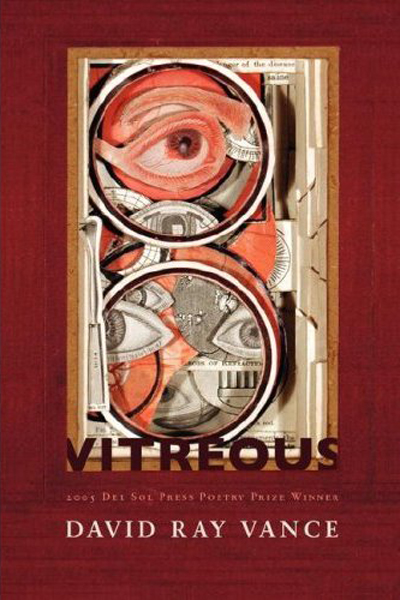Chosen by Mary Jo Bang as winner of the 2005 Del Sol Press Poetry Prize and published by Del Sol Press in 2007, Vitreous has appeared twice on the Poetry Foundation's Bestseller List and has been reviewed in Pebble Lake Review, in The San Antonio Express News, and in Disabilities Studies Quarterly. |
| |
Part rewritten 1934 medical text, part Keatsian reflection, this is the logical offspring of the long-awaited meeting of science and art; a marriage of equals where each half maintains its primary allegiance: the poetic to the common lyrical language of emotion and memory, the medical to its narrowly appropriated lexicon of intraocular, cornea, and Placido's disc. Mr. Vance has woven these two competingword streams into a meditation on sight and risk. Think of it as an item in the cupboard of the scientifically sublime. Think of Ronald Johnson's Ark. Vitreous is utterly fascinating in its reach, and exquisitely tender. And important, because it answers again today's recurrent question, "Can form be further broken and still be a poem?" The answer (of course) is "yes."
- Mary Jo Bang |
|
| |
The Korean character for "citizen" is based upon the image of an eye pierced by an arrow. The citizen, thus, is one whose vision has been wounded by the state; how can we see clearly when we're in the midst, in the thick of things? David Ray Vance's startling and rewarding debut is a kind of exhibition -- a virtual museum of poetic and found texts -- concerned with the vulnerability of the eye, the I's aperture, the world's window, the self's permeable edge.
- Mark Doty |
|
| |
Vitreous dazzles in the way the first pictures of the earth must have dazzled. This amazing collection exists in the vast distance between the body and the body perceived. Each poem makes alien both the form and function of our most essential organs through its innate understanding that we will succumb as easily to pollutants as we do to that caressing hand on our cheek. David Ray Vance, in this stunning book, offers a clinical yet intimate look at our modes of perceiving our haunting and vulnerable physicality.
- Claudia Rankine
|
|
|
